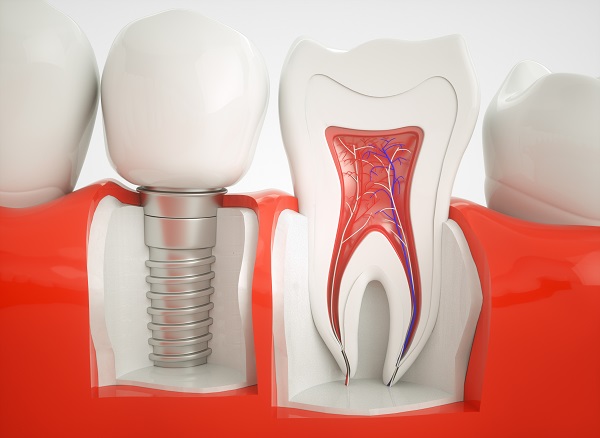Health Benefits of Dental Implants for Your Jawbone

One common option for replacing missing teeth is dental implants. Dental implants are popular because they look and function just like regular teeth. Replacing missing teeth is always recommended in order to avoid negative consequences. Read on to learn more about other benefits of getting dental implants, especially for your jawbone.
Benefits of dental implants
Bone needs stimulation to maintain both its density and form. In regards to the alveolar bone that surrounds and supports teeth, the stimulation comes from the teeth themselves. When a person loses a tooth, the lack of stimulation eventually causes loss of the bone. The width of the bone often decreases significantly during the first year after tooth loss.
The height also decreases over the following years. Tooth loss often leads to particular functional and aesthetic problems. The problems only become worse as a person loses more teeth. And after the alveolar bone is lost, the basal bone underneath it will also begin to resorb or melt away.
How bone can be regrown or preserved
A general dentist may recommend grafting bone into the extraction sockets. This may be done at the time of either tooth loss or removal. It can help to preserve the bone volume needed for the placement of the dental implant. Various surgical techniques can also help to regrow bone that has been lost. This can also help to provide an adequate bone substance for anchoring dental implants.
Implant benefits for the jawbone
One of the main reasons dental implants are often suggested is the maintenance of jawbone. Bone requires stimulation in order to stay healthy. In the course of the dental implant process, the implants fuse to the bone. This is beneficial because they stabilize it and eventually prevent further bone loss. Resorption is an inevitable process that is characterized by loss of bone when it is no longer connected to or supporting teeth. Luckily, dental implants can stop this process and preserve the bone.
Oral care tips for dental implants
Once a person has adequate bone, the rest of the implant surgery can proceed. Most implants are successful and there are some steps people can take to make them last for a long time. Practicing good oral hygiene is very important. A patient should floss once every day and brush twice a day.
Using interdental brushes will allow a patient to clean the hard to reach areas around the dental implant. Not smoking can be beneficial because smoking often weakens the bone structure. This can contribute to implant failure. Seeing the dentist regularly is also advisable. Cleanings and dental checkups every six months can help make sure the dental implant is in good condition. Chewing on hard foods should also be avoided.
Takeaway
Dental implants are replacement tooth roots that help to stimulate the bone, which helps to preserve it. This prevents the bone resorption that usually occurs with tooth loss. But you should always remember that sticking to a good oral hygiene routine is immensely important. Brushing and flossing regularly, regular dental visits, and avoiding harmful habits can ensure your implant lasts for a long time.
Are you considering dental implants in the Atlanta area? Get more information at https://atlantapamperedsmiles.com.
Check out what others are saying about our services on Yelp: Read our Yelp reviews.
Recent Posts
If you are looking for a tooth replacement method, you may want to consider a partial denture for one missing tooth. Although it may be tempting not to replace a tooth, especially if the gap is in the back and is hard to see, there are various consequences of not doing so. Although there are…
For patients who want to replace a damaged or lost tooth without undergoing invasive dental work, a partial denture for one missing tooth can be an excellent alternative. This dental appliance helps restore the look and function of the natural tooth and is completely removable for cleaning and maintenance. In fact, it is important to…
Teeth whitening has become a go-to cosmetic treatment for those looking to brighten their smile. With so many options available, it can be tough to choose the best one. Over-the-counter options can be convenient, but they have their drawbacks. Thankfully, professional teeth whitening treatments offered by dentists provide a safe, effective, and personalized way to…
For anyone who has a gap in their smile due to a missing tooth, a partial denture for one missing tooth can restore confidence. Dentures are commonly placed for aesthetic purposes, but there are two other reasons you should not hesitate to replace a missing natural tooth with a partial denture.You can get partial dentures…


